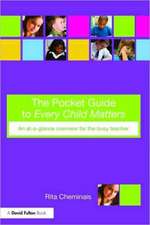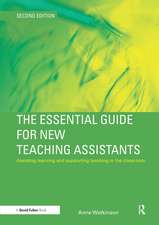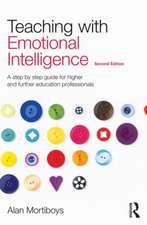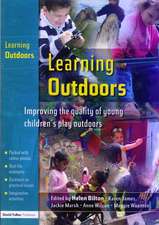Comparative Theology in the Millennial Classroom: Hybrid Identities, Negotiated Boundaries: Routledge Research in Religion and Education
Editat de Mara Brecht, Reid B Locklinen Limba Engleză Paperback – 18 mai 2017
| Toate formatele și edițiile | Preț | Express |
|---|---|---|
| Paperback (1) | 385.54 lei 43-57 zile | |
| Taylor & Francis – 18 mai 2017 | 385.54 lei 43-57 zile | |
| Hardback (1) | 1218.89 lei 43-57 zile | |
| Taylor & Francis – 14 dec 2015 | 1218.89 lei 43-57 zile |
Din seria Routledge Research in Religion and Education
-
 Preț: 303.89 lei
Preț: 303.89 lei -
 Preț: 302.17 lei
Preț: 302.17 lei -
 Preț: 304.28 lei
Preț: 304.28 lei -
 Preț: 366.52 lei
Preț: 366.52 lei -
 Preț: 309.69 lei
Preț: 309.69 lei -
 Preț: 370.77 lei
Preț: 370.77 lei - 21%
 Preț: 257.08 lei
Preț: 257.08 lei - 18%
 Preț: 999.46 lei
Preț: 999.46 lei - 14%
 Preț: 253.41 lei
Preț: 253.41 lei -
 Preț: 378.11 lei
Preț: 378.11 lei -
 Preț: 385.54 lei
Preț: 385.54 lei -
 Preț: 383.24 lei
Preț: 383.24 lei -
 Preț: 366.86 lei
Preț: 366.86 lei -
 Preț: 349.53 lei
Preț: 349.53 lei - 18%
 Preț: 1001.87 lei
Preț: 1001.87 lei -
 Preț: 386.88 lei
Preț: 386.88 lei - 17%
 Preț: 241.15 lei
Preț: 241.15 lei -
 Preț: 373.44 lei
Preț: 373.44 lei - 18%
 Preț: 1054.89 lei
Preț: 1054.89 lei - 18%
 Preț: 893.27 lei
Preț: 893.27 lei - 5%
 Preț: 351.29 lei
Preț: 351.29 lei -
 Preț: 381.33 lei
Preț: 381.33 lei - 18%
 Preț: 1003.30 lei
Preț: 1003.30 lei -
 Preț: 356.18 lei
Preț: 356.18 lei - 18%
 Preț: 1000.27 lei
Preț: 1000.27 lei -
 Preț: 370.55 lei
Preț: 370.55 lei - 18%
 Preț: 1000.27 lei
Preț: 1000.27 lei -
 Preț: 372.84 lei
Preț: 372.84 lei - 26%
 Preț: 766.33 lei
Preț: 766.33 lei
Preț: 385.54 lei
Nou
Puncte Express: 578
Preț estimativ în valută:
73.80€ • 80.19$ • 62.03£
73.80€ • 80.19$ • 62.03£
Carte tipărită la comandă
Livrare economică 21 aprilie-05 mai
Preluare comenzi: 021 569.72.76
Specificații
ISBN-13: 9781138086005
ISBN-10: 1138086002
Pagini: 254
Dimensiuni: 152 x 229 x 14 mm
Greutate: 0.36 kg
Ediția:1
Editura: Taylor & Francis
Colecția Routledge
Seria Routledge Research in Religion and Education
Locul publicării:Oxford, United Kingdom
ISBN-10: 1138086002
Pagini: 254
Dimensiuni: 152 x 229 x 14 mm
Greutate: 0.36 kg
Ediția:1
Editura: Taylor & Francis
Colecția Routledge
Seria Routledge Research in Religion and Education
Locul publicării:Oxford, United Kingdom
Public țintă
Postgraduate and UndergraduateCuprins
Introduction Part 1: Comparative Theology in a Millennial Classroom 1. (Un)Silencing Hybridity: A Postcolonial Critique of Comparative Theology Judith Gruber 2. Newman, Millennials, and Teaching Comparative Theology William L. Portier 3. Teaching and Learning Comparative Theology with Millennial Students Mary E. Hess 4. The Religion Classroom as a Site for Justice Wanda Scott Part 2: Interrogating Identity 5. Comparative Theology at the Intersections of (Multi)Racial and (Multi)Religious Identities Tracy Sayuki Tiemeier 6. Soteriological Privilege Mara Brecht 7. Teaching Tawhid: Unity through Diversity Syed Adnan Hussain 8. Feeling Comparative Theology: Millennial Affect and Reparative Learning Lisa Gasson-Gardner and Jason Smith 9. Constructing Boundaries by Crossing Them: Comparative Theology as a Practice of Community Self-Definition Reid B. Locklin Part 3: Getting (Comparatively) Theological 10. Among the "Nones": Questing for God in the Twenty-First Century Classroom Jeannine Hill Fletcher 11. What Muslims Can Teach Catholics about Christianity Rita George-Tvrtković 12. Recognizing the Place of African Traditional Religions in the Comparative Theological Discourse: Mediating Classroom Encounters through Storytelling SimonMary A. Aihiokhai 13. Dharma and Moksha, Works and Faith: Comparatively Engaging the Tension Between Ethics and Spirituality Madhuri M. Yadlapati 14. Knowing Their Rites: The Formation of ‘Textual Confidence’ among Jewish and Muslim Women in Academic and Community-Based Settings Shari Golberg 15. Teaching World Theologies through Film Jon Paul Sydnor Afterword Francis X. Clooney, S.J.
Descriere
This volume explores the twenty-first century classroom as a uniquely intergenerational space of religious disaffiliation, and questions about how our work in the classroom can be, and is being, re-imagined for the new generation. The culturally hybrid identity of Millennials shapes their engagement with religious ‘others’ on campus and in the classroom, pushing educators of comparative theology to develop new pedagogical strategies that leverage ways of seeing and interacting with their teachers and classmates. This volume theorizes the theological outcomes of current pedagogies and the shifting contours of comparative theological discourse.











